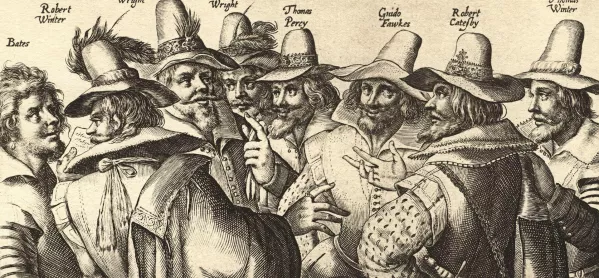Today, Guy Fawkes Night, is a reminder of an early example of state crackdown on terrorism that we curiously still celebrate. But the gory story of the plotters and their gunpowder is but a small part of a period when Britain was transformed, and it’s a shame that only this incident remains prominent in our national consciousness.
In school history lessons, the Stuarts have long lived under the shadow of those swashbuckling Tudors and their tales of matrimonial and religious strife. But the story of the Stuart century is just as dramatic, and many of the political challenges we face now can be traced back to that time.
Perhaps the problem has been that it is more challenging to bring the Stuarts to life in the classroom. It is a period where complex problems in society were argued and fought over, where there were monarchs with vastly different styles of leadership. But recent changes mean the Stuarts find themselves having a greater prominence in the curriculum. Some teachers are also new to the era. This all means support is needed, and with the assistance of the comedian and actor David Mitchell we are here to help.
I am one of a group of academics from the universities of Cambridge, Exeter, Nottingham and Oxford, in collaboration with experts from the Ashmolean Museum and the Bodleian Library, who have produced a series of short films and classroom resources using texts and artefacts from the period as points of entry into discussion of the key narratives and issues.
This week there is a new addition, an animated film, providing an outline to the Stuart era. It is narrated by David and uses iconic images from the period to bring it to life and help people of all ages to navigate their way through this challenging but pivotal era in British history.
November 5 could be the perfect point to begin introducing the Stuart era to students. The Gunpowder Plot came just 19 months after the death of Elizabeth I, when King James’s authority was far from assured. Like today there was tension between England and Scotland. The failure of the terrorist plot provided the Stuarts with the foundational narrative they needed. James himself took a personal interest in the interrogation of the culprits, and fostered an interpretation of their demise as an act of divine providence. The 5th of November would be remembered fondly - with prayers, sermons and bonfires - throughout the remaining years of Stuart rule in Britain.
There is much more drama in the Stuart era to engage students. There was a long and bloody Civil War, the execution of a King, a unique British experiment with republican rule and the overthrow of a Catholic monarch later by his Dutch son-in-law. Surely this makes Brexit and the strange political times we live in today seem tame by comparison?
There were two Stuart revolutions that meant Britain was remoulded in ways that would have been unthinkable to Guy Fawkes. The idea that the monarch should have divine right and absolutism crumbled and instead constitutional monarchy, political parties, and a public sphere of vibrant political debate emerged. The Stuarts created our united British nation, the merits of which are still questioned in Scotland.
Many of Shakespeare’s plays were written in the Stuart era, and the royal successions filled him with inspiration. Decades later, the great poet John Milton based his public career on his arguments in support of the execution of Charles. Some of the great political theorists of all time wrote in this period: from Thomas Hobbes to John Locke.
Cultural institutions that we now take for granted also emerged in the Stuart era. Indoor theatres became the norm by the end of the century, as did operas and female actresses. The founding of the Royal Society captured a Restoration mood of scientific advance. Newspapers erupted onto the scene after the collapse of censorship in the 1640s, and went from strength to strength in subsequent decades. And the first English novels - arguably - were written under the Stuarts.
You cannot ignore this part of history if you want students to get a full understanding of why the UK is how it is today. There is much more than Guy Fawkes to explore.
Professor Andrew McRae is head of the Department of English at Exeter University. He tweets at @McRaeAndrew
